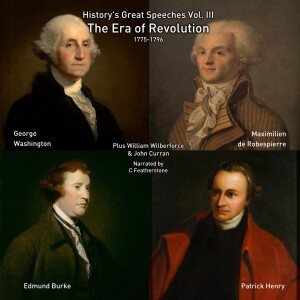
Six speeches about freedom and revolution from the American, French and Irish revolutions.
The first two speeches are from the American Revolutionary war (1775-1783), Patrick Henry’s Liberty or Death and George Washington’s Newburgh Address.
“Give me Liberty or give me death” is a quote that is recognized even today, over two centuries since Henry made his speech at the Second Virginia Convention. The speech is credited with providing troops from Virginia for the revolutionary war, and the audience included Thomas Jefferson and George Washington.
In the Newburgh Address, Washington has fought for eight long years after witnessing Henry’s speech, and implores his army to put their faith in him. A political movement against the revolution was gaining ground within the army, and proposed a mutiny because Congress has not paid them as promised. Washington needed to make clear to his generals that there was no option to surrender or turn away to unsettled lands, and that he was with them and on their side in the thick of both war and politics.
Next is William Wilberforce’s Abolition Speech to the British parliament in 1789, the apex of a campaign that led to slavery being outlawed across the British Empire.
Speeches from the French revolution then follow. First, there is the reaction from the aristocracy in England; a valediction from Edmund Burke, an MP in the British Parliament, on the beauty of Marie Antoinette and his sadness at her passing.
In counterpoint are four speeches by Maximilien de Robespierre, On Terror, Festival of the Supreme Being, Against Granting The King A Trial, and his Last Speech. Robespierre was one of the foundational members of the French Revolution, and laid down the political philosophy of liberty and the moral law over divinity and customary law. The speeches are filled with a passion for direct democracy and the rule of the people, not the elites.
The volume ends with a more measured, but no less impassioned, address by the Irish lawyer and statesman John Curran. It was given in Curran’s defence of Archibald Rowan, who was sentenced to transportation to Australia for his treasonous activities fighting for Irish independence. While unsuccessful, this rallying cry for genuine self-determination and free speech captures the heart of the conflicts that defined the era.
No comments yet. Be the first to say something!